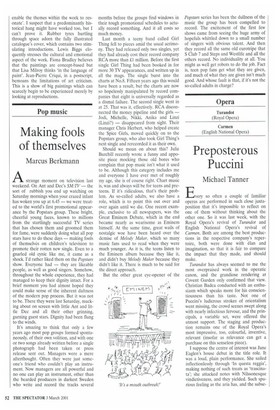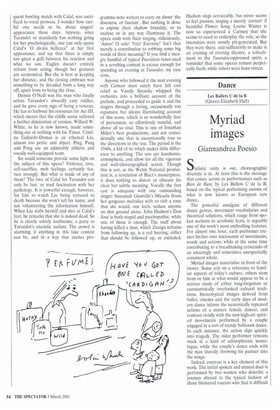Opera
Turandot (Royal Opera) Carmen (English National Opera)
Preposterous Puccini
Michael Tanner
Every so often a couple of familiar operas are performed in such close juxtaposition that it's impossible to reflect on one of them without thinking about the other one. So it was last week, with the Royal Opera's revival of Turandot and English National Opera's revival of Carmen. Both are among the best productions in the respective company's repertoire, both were done with élan and imagination, so that it is fair to compare the impact that they made, and should make.
Turandot has always seemed to me the most overpraised work in the operatic canon, and the grandiose rendering at Covent Garden only confirmed that view. Christian Badea conducted with an enthusiasm which speaks more for his conscientiousness than his taste. Not one of Puccini's ludicrous strokes of orientalism went missing, the crowd scenes swept along with nearly infectious fervour, and the principals, a variable set, were offered the utmost support. The staging and production remains one of the Royal Opera's most impressive, too, colourful, inventive, relevant (insofar as relevance can get a purchase on this senseless piece).
I suppose the centre of interest was Jane Eaglen's house debut in the title role. It was a loud, plain performance. She sailed inflectionlessly through 'In questa reggia', making nothing of such treats as `trascinata'; she attacked notes with Nilssonesque vindictiveness, and they yielded. Such spurious feeling as the aria has, and the subse quent bawling match with Calaf, was sacrificed to vocal prowess. I wonder how tactful one needs to be about singers' appearance these days. Anyway, since Turandot so manifestly has nothing going for her psychologically, one can only quote Calafs '0 divina bellezzar at her first appearance, and say that there is simply too great a gulf between his reaction and what we saw. Eaglen doesn't entirely refrain from acting, though her gestures are economical. But she is best at keeping her distance, and the closing embrace was something to be dreaded from a long way off, apart from its being the close.
Dennis O'Neill was the man who finally solves Turandot's absurdly easy riddles, and he gave every sign of being a veteran. He has to harbour his resources for Act III, which means that the riddle scene suffered a further diminution of tension. Willard W. White, as he is now known, made something out of nothing with his Timur. Cristina Gallardo-Domas is an ethereal Liu, almost too petite and abject. Ping, Pang and Pong are an admirably athletic and vocally well-equipped team.
So: could someone provide some light on the subject of this opera? Violence, love, self-sacrifice, mob feelings, certainly feature strongly. But what is made of any of them? The love of Calaf for Turandot can only be lust, or mad fascination with her pathology. It is powerful enough, however, for him to watch Liu being tortured to death because she won't tell his name, and not volunteering the information himself. When Liu stabs herself and dies at Calafs feet, he remarks that she is indeed dead. So he is clearly utterly loathsome, a party to Turandot's atavistic sadism. The crowd is alarming, if anything in this fake context can be, and in a way that excites pro gramme-note writers to carry on about `the discourse of fascism'. But nothing is done to expose their shallow brutality, or to analyse or in any way illuminate it. The opera ends with their singing, ridiculously, 'Amor! 0 sole! Vita! Eternitar Isn't that merely a contribution to robbing some big words of their meaning? If you find a meagre handful of typical Puccinian tunes used in a revolting context is excuse enough for spending an evening at Turandot, my case rests.
Anyone who followed it the next evening with Carmen must surely have felt vast relief as Vassily Sinaisky whipped the orchestra into a brilliant account of the prelude, and proceeded to guide it and the singers through a loving, occasionally too expansive but always illuminating account of this score, which is so wonderfully free of pretension, so effortlessly tuneful, and above all so vital. This is one of Jonathan Miller's best productions, and not coincidentally one that is exceptionally true to the directions in the text. The period is the 1940s, a kid of tic which makes little difference to anything. The sets are handsome, atmospheric, and allow for all the vigorous and well-choreographed action. Though this is not, as the Welsh National production is, a revelation of Bizet's masterpiece, it does nothing to distort or obscure his clear but subtle meaning. Vocally the first cast is adequate with one outstanding singer: Susannah Glanville's Micaela floats her gorgeous melodies with so rich a tone that she would, one feels, seduce anyone on that ground alone. John Hudson's Don Jose is both stupid and psychopathic, while one of those is enough. The stuff about having killed a man, which Zuniga refrains from following up, is a red herring; either that should be followed up, or excluded.
Hudson sings serviceably, but never seems to feel passion, singing a merely 'correct' if beautiful Flower Song. Louise Winter is now so experienced a Carmen that she seems to need to underplay the role, so the intensities were mostly pit-generated. But they were there, and sufficiently to make it an evening of riveting theatre, a refreshment to the Turandot-oppressed spirit, a reminder that some operas remain perpetually fresh, while others were born rotten.













































































 Previous page
Previous page